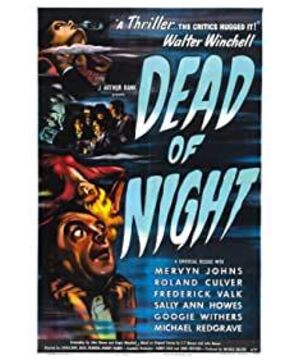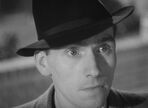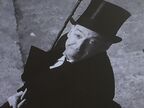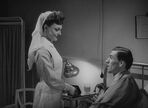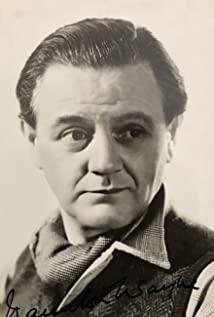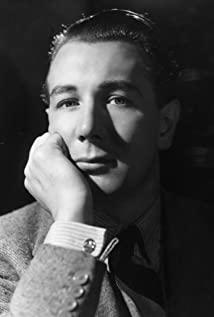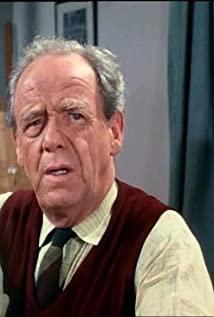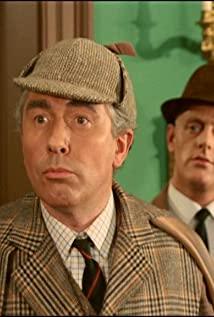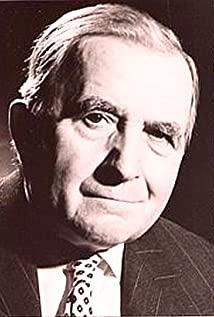The story is shot by Buzz Dearden, who is good at detective films (I have seen his "Sacrifice", "Beauty Bureau" and "International Assassination Bureau" are very good, and "Desert Dragon and Tiger Club" is more general): A middle-aged man, Craig, drove to a country house, where his good friend Mr. Foley had a small party with some friends. Craig went to the living room to see the guests at the meeting. He suddenly felt that these scenes and characters had appeared in his dreams. He could even predict what was going to happen next. Everything seemed familiar. The more it develops later, the more this kind of consciousness arouses the same views of the guests present, but the psychology professor among them does not agree with this, and has been using the method of psychoanalysis to rule out the fallacy of Clegg's so-called supernatural phenomenon, while the Legg has been hinting to everyone that something terrible is going to happen that night.
The stories told by the five characters at the party are as follows, and there are several places that make me a little nervous:
Story 1 "The Hearse Driver": The director is still Buzz Dearden, narrated by a young man. Granger, who was originally a racing driver, was injured in a car race and had hallucinations while recuperating in the hospital. The old driver of the hearse said to him from the window, "Sir, there is only one seat left", implying that he came to take the car. When the recovered racer was waiting for the bus, the old conductor said to him that "there is only one seat left", the racer did not get up, and the bus fell off the bridge before it went far.
This short story is the weakest in the whole film, but I quite like it. Apocalyptic with the color of prophecy, it is lucky to escape the catastrophe through the illusion generated by the hallucination of the protagonist.
Story 2 "Christmas Party": The director is Alberto Cavalcanti, who has never seen any of his films before. The passage is narrated by a young girl, Sally, who is playing hide-and-seek with a friend her age at a friend's villa one Christmas Eve. She hides in a small bedroom where a murder happened a hundred years ago, where she meets a little boy and nurses her to sleep. Later, when she came out of this bedroom, she realized that this boy did not exist here at all. This boy was actually the child who was murdered by her own sister.
Is it evil or is it an illusion created by oneself? We don't know, but the ghost of the boy killed by his own sister didn't hurt Sally, and Sally, who didn't know it, took care of the boy to sleep like a sister, letting the boy feel what his sister really should do.
Story 3 "Ghost Mirror": Directed by Robert Hammer, who directed "Benevolence and the Crown", narrated by Ms. Ian Ogilvy, - once, she bought an ancient mirror for her husband as a birthday present. But the husband always sees the image of another room in the mirror, and gradually his temper becomes weird. After a long time, the wife also found it strange. She learned from the owner of the antique shop who bought the mirror that the mirror was the mirror of an earl hundreds of years ago. He had been lying on the bed because of a leg injury. Restricted from being able to go out and being trapped in the house, his personality changed over time, and he began to suspect that his wife Hong Xing was out of the wall, and finally strangled his wife in front of this face. When Ms. Ogilvy came home, she found that her husband was cheating on her with her child and tried to strangle herself. The struggling Ms. Ogilvy smashed the mirror, and her husband gradually woke up...
The film uses a mirror to show the hero's wandering in the face of the real self and the virtual fantasy. In the mirror, do you see yourself or your potential dark side? If you have the courage to overcome it, these are reflected in the film.
Story 4 "Golf Story": directed by Charles Crichton, the director of "Thugs on Lavender Hill", who is good at making comedy. fish"! This story is the brainchild of science fiction guru HG Wells.
This story was told by a gentleman in the film to adjust the atmosphere, and it became a bottle of concoction in this horror short story collection.
Two golf buddies, George and Larry, fall in love with a girl, Mary, at the same time, and Mary loves them both, but they have to have one person to make her happy. So they decided to play golf to decide the outcome, and Larry, who failed, committed suicide by jumping into a river. After marriage, George lived happily until one day when he met Larry's ghost, but only Larry himself could see it. Larry could manifest but forgot the way to disappear, so he was very distressed, and George also began to help him analyze how to disappear. , but the ending is that George disappears...
This satire is very interesting and the ending is subversive. The two protagonists of the film are the comical Englishman Buzz Radford (Basil Radford, the old man and Michael Kane's special look) and Norton Wayne in "The Missing Lady" (Naunton Wayne), the two collaborated on many classic comedies and were rare comedy partners at the time.
Story 5 "The Puppet of Winterelli Oquist": The fifth story is also the most exciting story in the whole film, and undoubtedly the most disturbing horror story. No wonder it was used as the finale. This short film was also directed by "Christmas Party" director Alberto Cavalcanti, starring Michael Redgriff (great performance! Thumbs up!). The story, dictated by a psychiatrist, unfolds through well-known ventriloquist performer Winterellia Oquist Maxwell and his puppet Hugo. The ventriloquist Maxwell's puppet performance can be described as wonderful, and his ventriloquism and Hugo's mouth are also a perfect match. During a puppet show, he happened to meet another ventriloquist expert, Sylvester Qi. It seems that the puppet Hugo has a mind of his own, trying to tempt Sylvester to replace Maxwell. Sylvester always thought it was Maxwell's prank. At the hotel, Maxwell mistook Sylvester for stealing Hugo and shot him. In prison, Maxwell, who has always been considered innocent, was ridiculed in every possible way by Hugo and chopped into pieces in a rage.
At the end, Sylvester came to visit the prison and turned the plot into a 180-degree turn. Maxwell, who was lying on the bed, moved his lips and said to him in Hugo's voice: "You finally came to see me, I have been Waiting for you." As a psychiatrist, he came to the conclusion: Maxwell is not innocent, he is a schizophrenic. Maxwell, who has long lacked confidence in his puppet show skills, is also related to his many years of puppet performance, which made him gradually There was a split personality, splitting out the character of Hugo, the puppet who wanted to seek cooperation from others, and the weak essence character who lacked confidence in himself and refused to break with Hugo. So when I met Sylvester, the character of Hugo in my heart began to germinate to find Sylvester (of course, this character was presented by Maxwell holding a puppet), but Maxwell himself did not know it at all, and was always suspicious He mistakenly believed that Sylvester had stolen Hugo, so he shot and caused tragedy.
This short film unfolds the story in a short space. Isn't the split personality Maxwell at the end of the film the Norman Bates at the end of Psycho? Obviously, Hitchcock's "Psycho" also borrowed from this short film. And more influenced by it than Richard Attenborough's 1978 horror film "Magic" starring Anthony Hopkins - I also wrote a review of this film, Very nice movie!
Not only Magic, but also the early films about ventriloquism and puppets THE UNHOLY THREE (1925/1930), THE GREAT GABBO (1929) and DEVIL DOLL (1963).
After the five stories, the psychiatrist did fulfill Cray Grid's prophecy that he would break his glasses after pouring wine. When everyone was busy with their own business, Craig began to become hysterical and crazy. He used this kind of prophecy to complete the psychological satisfaction of killing a person, so as to solve the situation through a reasonable explanation without letting the People are suspicious. After strangling the psychiatrist, he also had hallucinations - the "bad things" in those stories ran out like a surreal kaleidoscope - playing hide and seek with some children, and he hid in the house where the murder took place He saw the weird ghost Gu Jing, and the warden said to him: "There is only one place left." After being locked in the prison, the puppet Hugo grabbed his throat... Then the nightmare suddenly woke up, it turned out Everything is a nightmare, and he wakes up to a call from his friend Mr. Foley inviting him to a country party.
Craig, who had apparently forgotten his nightmares, was overjoyed, and his wife's words "This is what you need, it (referring to the party) can help you get rid of those terrible nightmares" reminded Craig of something. Craig drove to the meeting place, the same farmhouse at the beginning of the movie, and Mr. Foley came to greet him. All of this and the beginning of the movie (in a nightmare) add radiance and radiance to each other. Was this a suggestion of the dream to him or was it a nightmare? The same is true for the ending of "The Box", which was just released in China not long ago, and this method is now relatively commonplace.
In 1945, shortly after Freud's death, a large number of films such as psychoanalysis and dream analysis appeared, such as "Dr. Edward" and "Love to Heaven", which were also interspersed with surrealistic features. The director deliberately arranges the confusion between dreams and reality to explain rationally that dreams are dominated by real life, and dreams will also match the bits and pieces of the real world at the same time. And is the disagreement between the party at the banquet and the psychologists also a confrontation between British conservative thinkers and surrealism, or a confrontation between superstition and science? This is the same as which one is more accurate, "The Interpretation of Dreams by Zhou Gong" or "The Interpretation of Freud's Dreams".
View more about Dead of Night reviews


